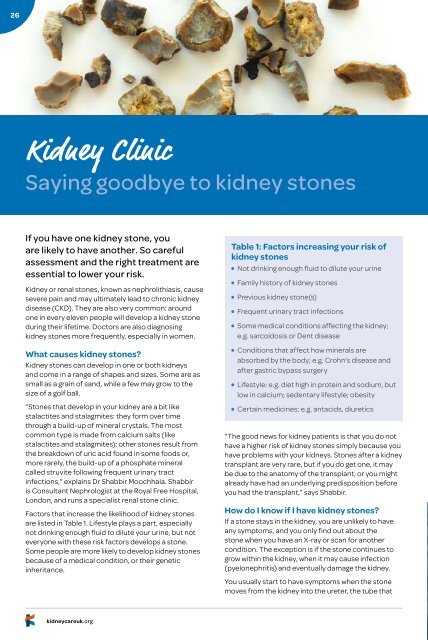Kidney Matters - Issue 7 Autumn 2019
Kidney Matters is our free quarterly magazine for everyone affected by kidney disease. This issue includes a delicious mexico bean nacho recipe from our Kidney Kitchen as well as articles about dialysis away from base, kidney stones, and a feature on looking out for children and young people with kidney disease. We know that being a kidney patient can be tough at times and that accessing the right help at the right time isn’t always easy. We’ve spent a great deal of time over the past year talking to kidney patients on dialysis, asking them what we can do to address this. The response was overwhelmingly ‘improved communication’ on what is going on in the kidney world and what is available to them in terms of support and how to access it. Kidney Matters has been developed to tackle this as well as the many other issues kidney patients face in day-to-day life. Along with shared patient experiences, Kidney Matters provides on how to access emotional and practical support, financial assistance through our grant schemes, advice from leading kidney specialists and tips on how to keep as well as possible by eating a healthy diet whilst on dialysis.
Kidney Matters is our free quarterly magazine for everyone affected by kidney disease.
This issue includes a delicious mexico bean nacho recipe from our Kidney Kitchen as well as articles about dialysis away from base, kidney stones, and a feature on looking out for children and young people with kidney disease.
We know that being a kidney patient can be tough at times and that accessing the right help at the right time isn’t always easy. We’ve spent a great deal of time over the past year talking to kidney patients on dialysis, asking them what we can do to address this. The response was overwhelmingly ‘improved communication’ on what is going on in the kidney world and what is available to them in terms of support and how to access it.
Kidney Matters has been developed to tackle this as well as the many other issues kidney patients face in day-to-day life. Along with shared patient experiences, Kidney Matters provides on how to access emotional and practical support, financial assistance through our grant schemes, advice from leading kidney specialists and tips on how to keep as well as possible by eating a healthy diet whilst on dialysis.
Create successful ePaper yourself
Turn your PDF publications into a flip-book with our unique Google optimized e-Paper software.
26<br />
<strong>Kidney</strong> Clinic<br />
Saying goodbye to kidney stones<br />
If you have one kidney stone, you<br />
are likely to have another. So careful<br />
assessment and the right treatment are<br />
essential to lower your risk.<br />
<strong>Kidney</strong> or renal stones, known as nephrolithiasis, cause<br />
severe pain and may ultimately lead to chronic kidney<br />
disease (CKD). They are also very common: around<br />
one in every eleven people will develop a kidney stone<br />
during their lifetime. Doctors are also diagnosing<br />
kidney stones more frequently, especially in women.<br />
What causes kidney stones?<br />
<strong>Kidney</strong> stones can develop in one or both kidneys<br />
and come in a range of shapes and sizes. Some are as<br />
small as a grain of sand, while a few may grow to the<br />
size of a golf ball.<br />
“Stones that develop in your kidney are a bit like<br />
stalactites and stalagmites: they form over time<br />
through a build-up of mineral crystals. The most<br />
common type is made from calcium salts (like<br />
stalactites and stalagmites); other stones result from<br />
the breakdown of uric acid found in some foods or,<br />
more rarely, the build-up of a phosphate mineral<br />
called struvite following frequent urinary tract<br />
infections,” explains Dr Shabbir Moochhala. Shabbir<br />
is Consultant Nephrologist at the Royal Free Hospital,<br />
London, and runs a specialist renal stone clinic.<br />
Factors that increase the likelihood of kidney stones<br />
are listed in Table 1. Lifestyle plays a part, especially<br />
not drinking enough fluid to dilute your urine, but not<br />
everyone with these risk factors develops a stone.<br />
Some people are more likely to develop kidney stones<br />
because of a medical condition, or their genetic<br />
inheritance.<br />
Table 1: Factors increasing your risk of<br />
kidney stones<br />
• Not drinking enough fluid to dilute your urine<br />
• Family history of kidney stones<br />
• Previous kidney stone(s)<br />
• Frequent urinary tract infections<br />
• Some medical conditions affecting the kidney;<br />
e.g. sarcoidosis or Dent disease<br />
• Conditions that affect how minerals are<br />
absorbed by the body; e.g. Crohn’s disease and<br />
after gastric bypass surgery<br />
• Lifestyle: e.g. diet high in protein and sodium, but<br />
low in calcium; sedentary lifestyle; obesity<br />
• Certain medicines; e.g. antacids, diuretics<br />
“The good news for kidney patients is that you do not<br />
have a higher risk of kidney stones simply because you<br />
have problems with your kidneys. Stones after a kidney<br />
transplant are very rare, but if you do get one, it may<br />
be due to the anatomy of the transplant, or you might<br />
already have had an underlying predisposition before<br />
you had the transplant,” says Shabbir.<br />
How do I know if I have kidney stones?<br />
If a stone stays in the kidney, you are unlikely to have<br />
any symptoms, and you only find out about the<br />
stone when you have an X-ray or scan for another<br />
condition. The exception is if the stone continues to<br />
grow within the kidney, when it may cause infection<br />
(pyelonephritis) and eventually damage the kidney.<br />
You usually start to have symptoms when the stone<br />
moves from the kidney into the ureter, the tube that<br />
kidneycareuk.org

















